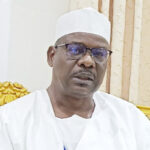Last week, the legal luminary and nonagenarian, Chief Afe Babalola, waded into the never-ending debate and search for a “true” structural order for Nigeria by providing a rather alarming prescription. Chief Babalola espoused the idea of a stop-gap six-month Interim National Government (ING) at the termination of President Muhammadu Buhari’s second term in May 2023. Making this suggestion at the Afe Babalola University campus in Ado Ekiti in a paper entitled: “The Triple Challenge: Balancing The Trade-offs and Policies to Achieve Economic, Social and Environmental Goals in the 21st Century”, the 92-year-old Senior Advocate of Nigeria (SAN), argued that an ING had become inevitable if Nigeria must overcome its multiple challenges.
Chief Babalola argued thus: “As soon as the President, the present government completes its term, do not hold a new election. Rather, let us have an interim government for a short period to discuss a new Constitution. This will consist of all retired presidents, vice presidents, governors and some selected people.”
According to him, Nigeria’s 1999 Constitution, which has been in operation in the country over the past 23 years, remains an imposition of the military and therefore, not in sync with current realities. “The same Constitution has made politics become not only very attractive but the only lucrative business in Nigeria today. What this means is that any election that holds under the present scenario will end up producing transactional and recycled leaders, with no ability to turn things around,’’ he said.
The ING, Chief Babalola reasons, will therefore draw up a new constitution for Nigeria, which, he says, “Should provide a true federal system of government, instead of the expensive presidential system of government” in the current system. Other suggestions by the university founder include part-time legislatures where lawmakers would draw only sitting allowances rather than salaries and the constitution of a body “At the local, state and federal levels to screen all aspirants on the sources of their wealth and means of livelihood, criminal record, which includes pending suits,’’
Daily Trust rejects the formation of an ING as a substitute for free and fair elections, next year or at any time going forward. In the first place, we are baffled that a lawyer of Chief Babalola’s standing would seek to replace free and fair elections open to all with an illegal assembly of elitist professionals. Besides, an interim government is not a panacea for all constitutional ills. An interim or provisional government is usually created to rescue a country from imminent collapse or intractable crises, mainly to enable actors in such crises to negotiate peace and conduct general or special election to ensure equitable power-sharing, as happened in some successor countries of the defunct USSR, Liberia, Sierra Leone, and the like.
Nigeria is not in the same situation as any of these and has gone too far from the end of the military era to retrace its steps back to 1999. Moreover, while the country is beset by many daunting challenges, including the security and economic challenges cited by Chief Babalola, they are not of the sort of scale that necessitates an interim government, however, conceived. In fact, Nigeria’s nasty experience with an ING in 1993 following the political stalemate of an aborted election is quite instructive here. The ING put in place by the military government of President Ibrahim Babangida was made up of renowned and respected technocrats and patriotic Nigerians. But no sooner was it constituted than it was declared illegal, null and void by a court, paving way for five more years of military dictatorship.
And to paraphrase the late Chief Obafemi Awolowo, even the most defective democracy is still far better than any unconstitutional regime, no matter how carefully put together. What Chief Awolowo meant is that legitimacy is fundamental to any conception of democratic government and indeed, government of any kind, and that democracies have their own inherent mechanisms for change. An ING cannot comfortably wear the toga of legitimacy under Nigeria’s circumstances, and would, instead, open a wide space for chaos, ethnic rancour and agitations, sectarian arguments, and the resurrection of ancient grudges, some of which have been settled under the 1999 Constitution of the Federal Republic of Nigeria.
The hackneyed debate about the default errors in the Constitution cannot be a reason to terminate the current democratic experience. At least, the National Assembly, since 1999, has deliberately amended apparently contradictory, contentious and unworkable sections of the Constitution. Indeed, many Nigerians across the divide have expressed a measure of support for some of the proposed amendment bills in the ongoing constitutional amendment processes. They still may fall short of what is expected of “true” federalism, but they do bear proof that the system is working and is amenable to being made to work better through elections or other processes.
Chief Afe Babalola has a right to free speech, and we will be the first to defend his rights as guaranteed under our constitution. However, we call on all well-meaning Nigerians to disregard any misguided reasoning that can only push the country backward. Nigeria cannot afford to resort to a failed approach.

 Join Daily Trust WhatsApp Community For Quick Access To News and Happenings Around You.
Join Daily Trust WhatsApp Community For Quick Access To News and Happenings Around You.


